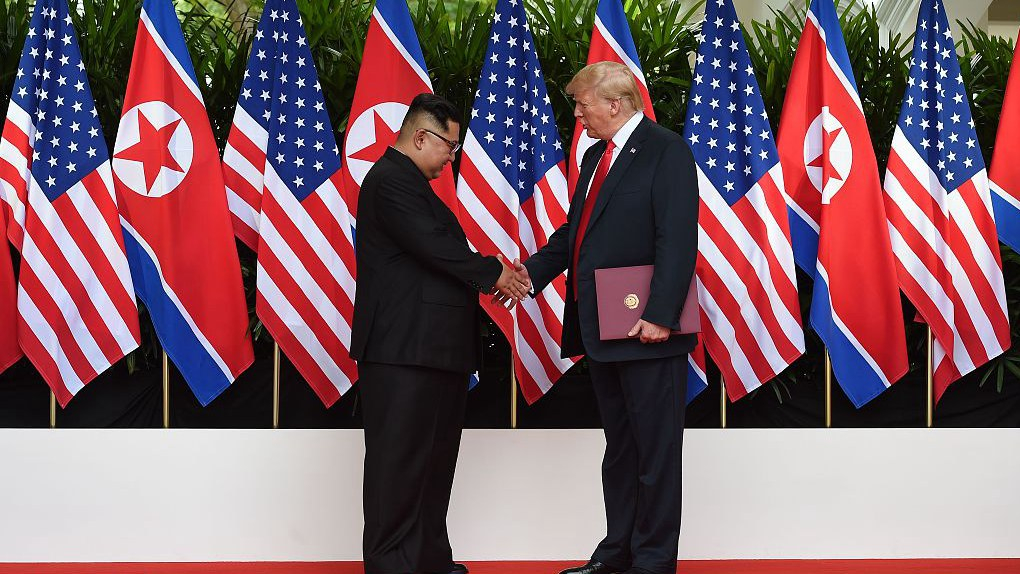
Opinion
08:53, 21-Jan-2019
Opinion: Hanoi is a good location for 2nd Kim-Trump summit
Updated
11:05, 21-Jan-2019
Tom Fowdy

Editor's note: Tom Fowdy, who graduated with an MSc in Chinese Studies from Oxford University having previously majored in politics at Durham University, writes on the international relations of China and the Democratic People's Republic of Korea. The article reflects the author's views, and not necessarily those of CGTN.
As preparations get underway for a second summit between the leader of the Democratic People's Republic of Korea (DPRK) Kim Jong Un and U.S. President Donald Trump, a number of potential locations for the meeting are being negotiated between the two countries.
On January 20, Bloomberg reported that the summit is likely to take place in Hanoi, the capital of Vietnam. Being a country that has positive relations with Washington and Pyongyang, the ASEAN nation serves as a middle ground between the two countries and a reliable stakeholder in the peace process. More importantly, such a location acts a solid incentive and a realistic model to Kim Jong Un as to what his country could become if continues to pursue economic reform and development.
Diplomatic relations between the DPRK and Vietnam have an extensive history dating back to the 1950s. The two countries, having been divided at the time, saw fit to cooperate against what they saw as a common U.S. adversary in Asia, finding greater solace in each other than their larger parts such as China and the USSR.
As the Vietnam War waged on, Kim Il Sung gave financial and military assistance to Ho Chi Minh in his effort to reunify the country. The DPRK leader would even visit Vietnam several times himself in this era.

U.S. President Donald Trump (L) speaks to the media as he walks with DPRK leader Kim Jong Un (R) during a break in talks at their historic summit at the Capella Hotel on Sentosa island in Singapore, June 12, 2018. /VCG Photo
U.S. President Donald Trump (L) speaks to the media as he walks with DPRK leader Kim Jong Un (R) during a break in talks at their historic summit at the Capella Hotel on Sentosa island in Singapore, June 12, 2018. /VCG Photo
The world, however, changed and the two countries, once very similar, drifted apart. The key factor is simple: Hanoi won its struggle with the United States, the DPRK did not. With the country reunified, Vietnam re-emerged victorious from the war as a confident country, finding the scope to form a new diplomatic relationship with Washington. It would later also opt to change its fortunes through economic reforms, beginning a trajectory of growth and rapid development.
On the other hand, Pyongyang, locked in a stalemate with the U.S. dating back to 1953 with Korea still divided between two competing regimes, would find itself insecure to the point it has been unable to move forward.
Thus, as Vietnam boomed and integrated itself into the international system, the DPRK has stood still, suffering from economic decline and concentrating its resources on the development of nuclear and missile programs in the bid to overcome its disadvantages against the hegemon.
Now, however, comes a new opportunity to change that. The second summit between Kim Jong Un and Donald Trump provides an unmistakable chance for the two countries to make progress on ending the long drawn hostility and normalizing a relationship that has been driven by crisis.
Indeed, whilst it remains highly unlikely that the DPRK will ever fully surrender their nuclear weapons program, the sentiment and legacy that such a summit sets are crucial for stability, setting a foundation which can ensure the events of 2017 will not return.
On that note, Hanoi is a highly influential location, and as Vietnam has a common history with the DPRK and ideological heritage, as well as having cordial ties with Washington, such a visit helps Kim map out a realistic way forward for the DPRK.
Only a month ago, the country's foreign minister Ri Young Ho visited Hanoi and made comments that Vietnam was indeed Pyongyang's preferred model, largely because it is a smaller country, or “shrimp amongst whales,” that has made its way through its own contention with the U.S.
As a result, all hopes should be on Vietnam as the potential location. It offers lessons and perspectives to the DPRK which a western country simply cannot muster.
(If you want to contribute and have specific expertise, please contact us at opinions@cgtn.com)

SITEMAP
Copyright © 2018 CGTN. Beijing ICP prepared NO.16065310-3
Copyright © 2018 CGTN. Beijing ICP prepared NO.16065310-3